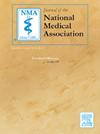Enhancing health attitudes and information engagement among African American men using an online health education intervention
IF 2.5
4区 医学
Q1 MEDICINE, GENERAL & INTERNAL
引用次数: 0
Abstract
Background and objectives
In this article, we describe the results of a 6-month follow-up assessment among African American (AA) men who participated in the Black Men’s Health Forum, a 6-week online health education intervention.
Methods
A pre-post survey design was used to capture attitudes and behaviors before and 6-months after the intervention. The 6-month follow-up used the health conscious scale, Health Information Orientation Scale (HIOS), and the Short Multidimensional Inventory Lifestyle Evaluation (SMILE) to assess changes in attitudes toward health, health information seeking, and health behaviors. In addition, the influence of accountability partners among AA male participants of the forum was examined.
Results
A sample of 24 AA men [61.7 years of age (range: 34.1 to 75.9 years of age)] completed the follow-up. Participants became more self-aware of their health (5.6 to 6.2, p = 0.0093), more motivated to improve health (5.8 to 6.5, p = 0.0181), and took more personal responsibility for their health (5.6 to 6.4, p = 0.0099). Results from the HIOS revealed that health information engagement increased among participants (2.7 to 3.1, p = 0.0168).
Conclusions
AA men’s attitudes towards health and information engagement were successfully improved through an online health education intervention. In addition, we leveraged family and friends in the lives of men to serve as a support system for men in the study to help improve health behaviors.
利用在线健康教育干预提高非裔美国男性的健康态度和信息参与。
背景和目的:在这篇文章中,我们描述了一项为期6周的在线健康教育干预——黑人男性健康论坛——对参加该论坛的非裔美国人(AA)男性6个月随访评估的结果。方法:采用前后调查设计,对干预前和干预后6个月的态度和行为进行问卷调查。随访6个月,采用健康意识量表、健康信息取向量表(HIOS)和短多维生活方式量表(SMILE)评估健康态度、健康信息寻求和健康行为的变化。此外,还考察了问责伙伴对AA男性论坛参与者的影响。结果:24例AA男性[61.7岁(范围:34.1 ~ 75.9岁)]完成随访。参与者更加自我意识到自己的健康(5.6到6.2,p = 0.0093),更有动力改善健康(5.8到6.5,p = 0.0181),并对自己的健康承担更多的个人责任(5.6到6.4,p = 0.0099)。HIOS的结果显示,参与者的健康信息参与度增加(2.7至3.1,p = 0.0168)。结论:通过在线健康教育干预,AA男性对健康和信息参与的态度得到了成功的改善。此外,我们利用男性生活中的家人和朋友作为研究中男性的支持系统来帮助改善健康行为。
本文章由计算机程序翻译,如有差异,请以英文原文为准。
求助全文
约1分钟内获得全文
求助全文
来源期刊
CiteScore
4.80
自引率
3.00%
发文量
139
审稿时长
98 days
期刊介绍:
Journal of the National Medical Association, the official journal of the National Medical Association, is a peer-reviewed publication whose purpose is to address medical care disparities of persons of African descent.
The Journal of the National Medical Association is focused on specialized clinical research activities related to the health problems of African Americans and other minority groups. Special emphasis is placed on the application of medical science to improve the healthcare of underserved populations both in the United States and abroad. The Journal has the following objectives: (1) to expand the base of original peer-reviewed literature and the quality of that research on the topic of minority health; (2) to provide greater dissemination of this research; (3) to offer appropriate and timely recognition of the significant contributions of physicians who serve these populations; and (4) to promote engagement by member and non-member physicians in the overall goals and objectives of the National Medical Association.

 求助内容:
求助内容: 应助结果提醒方式:
应助结果提醒方式:


